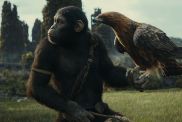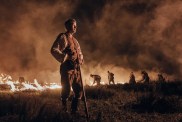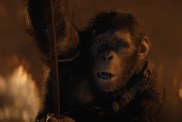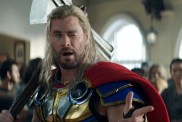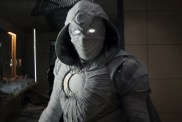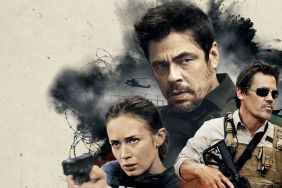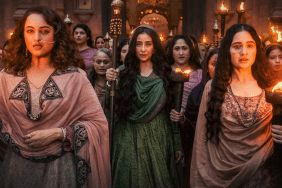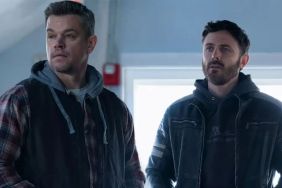During the five-year development and production on Arthur and the Invisibles–as the gnomish creatures would be redubbed for American audiences–Besson proceeded to write a series of French children’s books about the characters, and the movie is finally going to be released here on Friday with Freddie Highmore (Charlie and the Chocolate Factory) playing and voicing Arthur in the half live-action, half-animated movie.
ComingSoon.net had a chance to talk exclusively with Besson about his reasons for switching gears, plus he elaborated on the inner workings of his prolific production company EuropaCorp.
ComingSoon.net: By doing this kids movie, were you internationally trying to get away from the violence of some of your previous movies?
Luc Besson: It’s not intentional. I think it’s natural. In the ’80s, the society I was living in Paris was kind of bourgeois, le gauche, caviar, you know? And you’re younger and you’re tough, and you want just to kick a little and talk about the dark side, especially after “Big Blue.” But then the world today is so hard. You see so much pain around the world, and I don’t feel as a director to kick some more. I feel they’ve kicked enough. Naturally, you want to caress. You want to give some aspirin. You want to be nice.
CS: Back in the late ’80s, you sort of redefined French film, which at the time was thought to be very artsy and cultured
Besson: Are you scared to say boring?
CS: I guess you could say that, but you brought genre to it and made very distinct kinds of action films. You’re still writing those kinds movies, but was the driving force to do “Arthur and the Invisibles” something to do with having kids?
Besson: No, not so much. I don’t feel so proud as a human being today, as an adult. Me, I’m not proud of the [rest of the world] either, it’s not just me, it’s not my fault. I don’t feel so good, I don’t feel proud, to leave the world the way we’re leaving it to the 800 richest people in the world who have all the money to the 800 millions of poor people. Something is wrong. I mean, c’mon. I’m not part of the 800 guys; I’m not part of the 800 million, but we cannot live like this. We’re going through a catastrophe if we live like this. There’s billions of people who live with one dollar a day, and global warming and pollution. You feel responsible, so you turn to who? You can talk to adults–and there’s better people than me who can talk about it, because I’m not a specialist, I’m just a citizen–or you can tell a story to a younger audience to at least try to give them some feeling so that they can be better than us.
CS: Do you think those ideas come across to the kids who might see it?
Besson: You never know, but if you don’t do it, it will never happen.

Besson: Yeah, to have a more distant approach. The other day I was in school with my five-year-old, and inside her classroom, there’s Muslim, Jewish, Christian, black, yellow, every type and you know what? They don’t care. They play together. And then it struck me. God, it’s going to take us 20 years to teach them how to hate each other. Yeah, but how is it possible? And why if they don’t hate each other [now], why are we going to teach them how to hate each other? They show us how to act, in fact.
CS: As people get older, they start to act more and more as one might assume a 5-year-old would act, but kids can actually be better behaved than many adults.
Besson: Exactly. My wife is from Senegal, so half my family comes from deep Africa, and I didn’t choose my wife for that, ’cause she was a lovely person first, but in a way, it makes me so happy to have kids who are caramel and to be able to not just say it, but actually show it and do it.
CS: With this movie, it seems to us that you’ve taken five years off from directing, which is not the case at all. Did you take any time off at all after finishing “Joan of Arc”?
Besson: No, probably a month or two, but that’s it, because after “Joan of Arc,” I started EuropaCorp five or six years ago and we already produced 64 films in 6 years, almost ten per year. Some are French films, some from Denmark, Italy, Spain, and some here like “The Transporter,” “Danny the Dog” (“Unleashed”), “Kiss of the Dragon”
CS: Funny you should bring that up, because I’ve interviewed Louis Letterier and Pierre Morel, and they basically have said that you are the film industry in France these days, between your company and Studio Canal.
Besson: It was not our goal, and I would rather not be the first one, I’d rather be the fifth one, which would show how healthy we are, but unfortunately, we’re one of the biggest producers in Europe now with 10 to 12 films per year.
CS: Even though you’ve said you don’t want to direct anymore, you’ve created this stable of French genre directors who are all very in demand after making movies based on your scripts. What’s your system for grooming these directors and putting them through the system until they can direct?
Besson: There’s no rule. I try to build a kind of oasis, where people can land there. If they have ideas, if they’re good, if they’re cool, we will find one day an opportunity where they can do something. Pierre Morel, I’ve known him for a long time. He was working on Steadicam on “Joan of Arc.” The guy’s very cool, he can handle any kind of situation, he can be in the mud for many days
you can feel the guy is ready. He was DP on the first “Transporter,” and one day I have this little French film “B13” with unknown actors. I gave him the script and he met the guys and said, “Okay, let’s do it.” It’s funny, because it’s simple. I have to thank the audience for it, because I make a few films that are quite successful, so it brings enough money to the company so we can have this freedom to take two unknown actors and an unknown director and make a first film. I produce like three first films per year.
CS: As far as being the producer and writer on many of these films, how involved are you on set in terms of bringing your original vision to life?
Besson: My best quality as a producer is that I’m a director. It means that I don’t have to prove anything. Some producers, they’re scared to be a director, so they pollute the guy, they put their sh*t on the guy for nothing. So I never have fights with directors, because it’s their film, for sure. I always try to bring some of my expertise, but I’m always very careful to respect their world and how they want to do the film. For example, because you’ve talked with Louis and Pierre, they’ll probably tell you that I’m not on the set so much. I come if they call me

Besson: Yeah, sometimes, because it happens, they’re very tired and they have this big scene with three cameras, and they say “Luc, can you come tomorrow? I’m exhausted. Can you give me help?” So then, “Okay, I come.” I give some energy and they’re back on track.
CS: I guess you can understand where they’re coming from, since you’ve expressed having felt exhausted making movies yourself. I don’t think people understand when you say you’re not going to direct, that you’re still making movies and heavily involved with them.
Besson: Well, I love to write, I love to produce. I’m not going to disappear at all. It’s just the job of directing is so demanding that you can’t do that all your life. And I don’t do small films, so it’s always
I write, I direct, I hold the cameras, I’m in the editing room, I do everything until the end.
CS: We talked a bit about some of your upcoming projects, but what happened to the collaboration you did with Guy Ritchie, “Revolver”? It played at the Toronto Film Festival then never got a release here.
Besson: Honestly, it’s one of the most beautiful films that I produced in six years. I’m in love with this film. It’s a very intelligent, maybe a little too much, because maybe people say, “Oh, Guy Ritchie, it’s going to be cool, kind of a ‘Snatch’ film” and they’re disappointed because they need to think during the film. They’re looking for “Snatch” and they’re disappointed because after ten minutes, it’s not “Snatch.” It’s the same guy, it’s the flavor, but it’s so bright, it’s so intelligent. It’s like a chess party, so you have to follow or else you get lost.
That was ComingSoon.net’s exclusive chat, but here’s more with M. Besson from a roundtable interview earlier in the day:
CS: Is this really going to be the last film you direct and why?
Besson: Yeah, probably. I started thirty years ago, I’ve made ten films. I’m tired. Maybe as a sport guy, can he beat his record every week? No. One day he has to accept that after spring and summer, there’s autumn and winter, and I feel in autumn. I have too much respect for myself, first, for the moviegoers and for the cinema in general. I feel lucky. I can’t just make a film. I can’t go to Hollywood, take a big check and make a film. It’s an act of faith, and I give everything to a film. On ten films, there’s four that I finished collapsing on the ground, because I was too tired, so it’s a good average. I need to give everything to a film, and I don’t feel courageous enough to do it again.
CS: Was making this movie somewhat easier than the others because you had a lot of the animation team doing the heavy work?
Besson: No, I was there for five years every day. It was physically less difficult, because in fact, every morning I come from 9 to 11 with nerds with the mouse, and they barely say “Hi” to you. So for the first few months, it was difficult, because I’m used to actors, actresses with screams and tears, and “the sun is coming so we have to run.”
CS: At what point were you writing the books based on the characters?
Besson: I wrote the script first and I started the book a year after, because there were a lot of journalists in my country asking, “What are you doing?” so I decided to make the book so they could at least read the story. The funny thing is that four years later, they’re asking, “What’s the film about?” and I say, “Ask your kids.” The real beginning of “Arthur” is this gentleman called Patrice Garcia, he worked on “The Fifth Element.” He was one of the main designers, and he came to see me on the editing of “Joan of Arc” with a drawing of Arthur seated on a leaf, and I fell in love and I said, “We should do that. It’s wonderful.” That was how it started. The three big movements was writing the script and the storyboard and creating each character and the world, that’s in 2D, a team of five people for three years, they have done 14 or 15,000 drawings. That’s the first step, and then you get the storyboards. Then after I shot the entire film with actors, you play without sets, only with a camera, no wires (sensors)
you’re not obliged to reinvent the system where the actors can be totally free. So I filmed all the shots one by one, it takes seven months, and then I edit the film like a normal film, then I give the film to the computer guys. During this time, they were passing from 2D to 3D for each character and that was very long. Some of the characters arrived very fast like Balthazar, Malkos, the bad guys arrived very fast, it’s easier to do bad guys. The last one that we finished was Selenia, that we basically finished six months ago, so she spent three years in “plastic surgery.”

Besson: You know, a few days ago I saw the American poster and I realized the cast. (laughs) Oh, my God! There’s all these people in the film? I couldn’t believe it, because in fact, I see them one-by-one over the course of four years. Madonna, I recorded her three years ago, and De Niro like four months ago. I was so happy to get out of the room with the nerds to come here and spend two days with Robert and then I go back and then three weeks later, I see Jimmy Fallon. You don’t really have the feeling to have this cast. You don’t do a dinner with everybody where you can say, “Thank you very much for being in my film.” (laughs) You realize later in fact, and I’m lucky, it’s wonderful. You call, take a coffee and talk, and they say “Yes” right away almost all of them. I guess I’m happy I’ve made some films they can watch before. For David [Bowie], I know it was the story first. The first thing he asked, he said, “Oh, it looks interesting, can I have the book?” because he has a child and he wants to make sure what we’re going to say in the story was proper, which I really liked in fact. I liked that he took it seriously. I think when you talk to kids, you have to be careful and serious, so I was happy he reacted like this. The fastest one was Madonna, of course. “Oh, yeah? Okay, when?” That was it. She’s gorgeous for that. You call and she just says, “Sounds good, when?”
CS: How involved were Madonna and Snoop Dogg in the look of their characters or were they all designed beforehand?
Besson: I had to thank Madonna because she said “Yes” before she watched the drawings (sic). Snoop, I didn’t know him. Madonna, I know her, because we made a video together, and David I know through his wife that I met a long time ago, so we’re friends. But Snoop, I never met him. I got his manager, and of course, they loved “The Professional” and “Nikita” and all that stuff. I have a good awareness of all these guys in gangs, and they love me.
We filmed Snoop with nine cameras because nobody can move like him, it’s just impossible. Maybe an octopus. Otherwise, no one can play this part. For the rest of the cast, like David and Madonna, we have a camera just taking the lips, both sides, because we recorded them before [filming the actors]. So the actor who plays David–this great actor [named] Christensen]–he hears playback, so he’s acting with the voice of David Bowie.
CS: Why did they change the names of the characters to the “Invisibles” for the American release, even though they’re still called Minimoys in the movie?
Besson: I don’t know. Yeah, Mr. Weinstein thought it was better, and you have to trust the people you work with, if they think it’s better, as long as they don’t change the film.
Arthur and the Invisibles opens everywhere on Friday, January 12.
